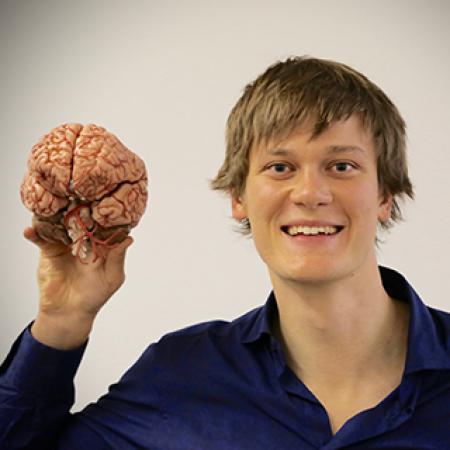Merton DPhil student wins Sherrington Prize in Neuroscience
Lukas Krone, a graduate student studying for a DPhil in Neuroscience, has been awarded this year's Sherrington Prize for outstanding achievement in the MSc in Neuroscience. Lukas, who graduated from Germany's Freiburg University with a first-class degree in Medicine, said that winning the prize was a "very positive surprise". He continued:
"However, the real reward of this year on the MSc in Neuroscience was the mutually supportive atmosphere and fruitful interactions in our class. Out of 20 students, we had 14 different nationalities and academic backgrounds ranging from maths and chemistry to medicine and psychology. This pool of talents, knowledge, and ideas definitely broadened my understanding of neuroscience and made the course very enjoyable."
Lukas has a particular fascination with sleep:
"Sleep is vital, as we learn from the detrimental consequences of sleep restriction and sleep loss. However, we’re just beginning to understand why animals require sleep and how sleep is regulated.
“I was thrilled to hear that the 2017 Nobel Prize in Physiology and Medicine was awarded for the delineation of the molecular mechanisms of the circadian clock. We know that sleep is controlled by two interacting processes: a circadian rhythm and a use-dependent need for sleep. While ground-breaking discoveries have provided us with a detailed understanding of the circadian clock, the mechanisms behind the use-dependent sleep need remain largely elusive. I’m convinced that by investigating the fundamental principles of sleep neurophysiology from fruit flies to humans, we can solve the enigmas of why sleep is needed and how it is regulated!
“Basic sleep research is directly related to medical practice. Sleep problems are highly prevalent but rather difficult to diagnose and treat as we know little about their underlying neurobiology. As a medical doctor, I hope that my research into sleep regulation will ultimately aid the diagnosis and treatment of sleep disorders.”
Lukas's first MSc project, carried out in Professor Gero Miesenböck's laboratory at the Oxford Centre for Neural Circuits and Behaviour, used a computational and behavioural screen to identify sleep-regulating neuronal populations in the fruit fly. In his second MSc project, he investigated spatiotemporal dynamics of brain activity during sleep in mice working in the Vlad Vyazovskiy Laboratory at the Sleep and Circadian Neuroscience Institute. He is now continuing this project as a DPhil student collaborating with Professors Colin Akerman and Zoltán Molnár.
Lukas, who came to Oxford after becoming one of only six from around 200 applicants to be given a place on the Wellcome Trust Doctoral Training Programme in Neuroscience, is currently president of the Cortex Club, Oxford’s Neuroscience Society, hosting world leading neuroscientists for talks and informal networking with students and postdocs.
And as a fellow neuroscientist he was delighted to hear that Merton's next Warden is to be Professor Irene Tracey FMedSci, currently Head of the Nuffield Department of Clinical Neuroscience:
"I'm certain that Merton has made a brilliant choice in electing Irene Tracey as the new Warden. She's not only a world-leading expert in the field of brain imaging and pain research but also an outstanding personality. For me, she's the role model of a modern scientist, mastering a diverse range of subjects from biochemistry to neuroimaging and continuously translating findings from basic research into clinical applications. I have had the honour of meeting her a few times to discuss research and can attest that she's an incredibly charismatic mentor."
The Sherrington Prize, awarded annually to the best student on the MSc in Neuroscience, is named after Sir Charles Scott Sherrington, a Nobel laureate who served as President of the Royal Society in the early 1920s and held the Waynflete Chair of Physiology at Oxford from 1913 to 1935.
